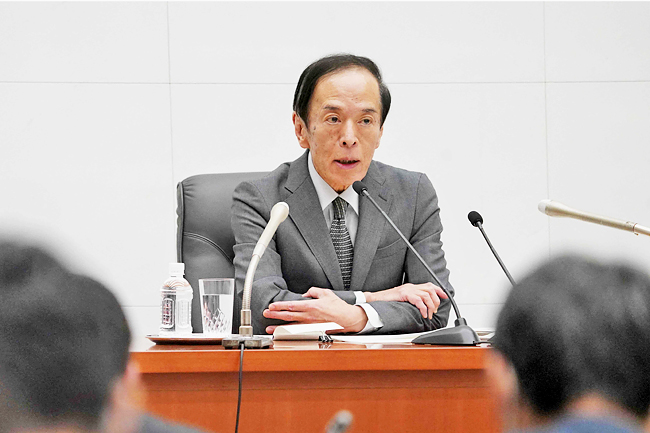TOKYO (AFP) – The Bank of Japan (BoJ) announced a review of its longstanding monetary easing measures yesterday, but said it would maintain them for the time being in the first policy decision under new governor Kazuo Ueda.
Analysts say the central bank’s stimulus measures, which have been in place for a decade and were supposed to deliver a vital boost to the Japanese economy, are looking increasingly unsustainable. “The bank has decided to conduct a broad-perspective review of monetary policy, with a planned time frame of around one to one-and-a-half years,” a BoJ statement issued after a two-day meeting said.
In the immediate term, the institution left its negative interest rate in place and did not adjust the band in which rates for 10-year government bonds fluctuate.
No major policy overhaul had been expected from former economics professor Ueda, who took over this month from Haruhiko Kuroda, the architect of the bank’s signature ultra-loose strategy.
Moving away from monetary easing will be a tricky balancing act for Ueda, who faces pressure to normalise the bank’s policy while minimising any shock to the economy.
The yen’s value has weakened since early 2022 because the BoJ has consistently bucked the global trend of aggressive interest rate hikes to battle inflation.

The bank’s two-per cent inflation target has been surpassed every month since April 2022, but the central bank argues rises are linked to temporary trends such as the Ukraine war.
Ueda has called the BoJ’s current stance “appropriate” and warned of the risk of sudden moves, given global economic uncertainty.
After yesterday’s BoJ announcement the yen fell to JPY134.86 against the dollar, from JPY133.83 in morning trade.
The BoJ hiked its inflation forecasts for the current and next financial years, excluding volatile fresh food prices.
It now predicts 1.8 per cent in 2023-24, and two per cent in 2024-25, “mainly due to a higher projection for wages”.
Salaries have been stubbornly stagnant in Japan but there are signs they may finally be rising, with major companies including Toyota, Nintendo and Uniqlo parent Fast Retailing announcing substantial wage hikes in recent months.
In 2025-26, the bank expects a dip in inflation to 1.6 per cent.
Executive economist of Nomura Research Institute Takahide Kiuchi, said in a note last week that the demand-driven two-per-cent inflation the bank wants is hard to attain. “Ueda must be thinking that achieving the two per cent inflation goal in a sustainable way would be difficult,” Kiuchi said.
Instead, the target could first be made more “flexible”, for example by setting it as a mid- to long-term goal, he suggested.



















































